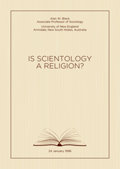The above analysis shows that the seven dimensions of religion identified by Smart are all present in Scientology. It also shows that although Scientology has its own distinctive characteristics, many of its beliefs and practices are similar to, or analogues of, those found in one or more other recognized religions.
Although Scientology has its own distinctive characteristics, many of its beliefs and practices are similar to, or analogues of, those found in one or more other recognized religions.
The question as to whether Scientology is a religion has also been considered in the High Court of Australia (The Church of the New Faith v. The Commissioner for Payroll Tax, Australian Law Journal Reports 57 [1983]: 785ff.). The unanimous opinion of that Court was that Scientology is a religion. In their judgments in that particular case, Justices Mason and Brennan used two criteria of religion: “(i) belief in a supernatural Being, Thing or Principle; and (ii) the acceptance of canons of conduct in order to give effect to that belief” (Australian Law Journal Reports 57 [1983]: 785). Justices Wilson and Deane used four criteria as aids in determining whether a particular system of ideas and practices constituted a religion:
(i) that the particular collection of ideas and/or practices involved belief in the supernatural, that is, belief that reality extended beyond that which was capable of perception by the senses; (ii) that the ideas related to man’s nature and place in the universe and his relation to things supernatural; (iii) that the ideas were accepted by adherents as requiring or encouraging them to observe particular standards or codes of conduct or to participate in particular practices having supernatural significance; (iv) that, however loosely knit and varying in beliefs and practices adherents might be, they constituted an identifiable group or identifiable groups. (Australian Law Journal Reports 57 [1983]: 785)
One or more of the Justices in this case specifically considered the fact that there have been additions to the beliefs and practices of Scientology since it was first formulated, that Scientology does not insist that its adherents should discard other religious affiliations, and that there is a strong commercial emphasis in Scientology’s practices. The Justices concluded that none of these facts disqualified Scientology from being recognized as a religion; indeed, similar statements of fact could be made about some other recognized religions at various points in their history.
For the reasons given in the preceding analysis, I consider that Scientology is rightly regarded as a religion. As well as having the salient generic characteristics that typify recognized religions, Scientology has its own distinctive features—particular beliefs and practices that mark it out as a different religion rather than a non-religion.
Alan W. Black
24 January 1996





























